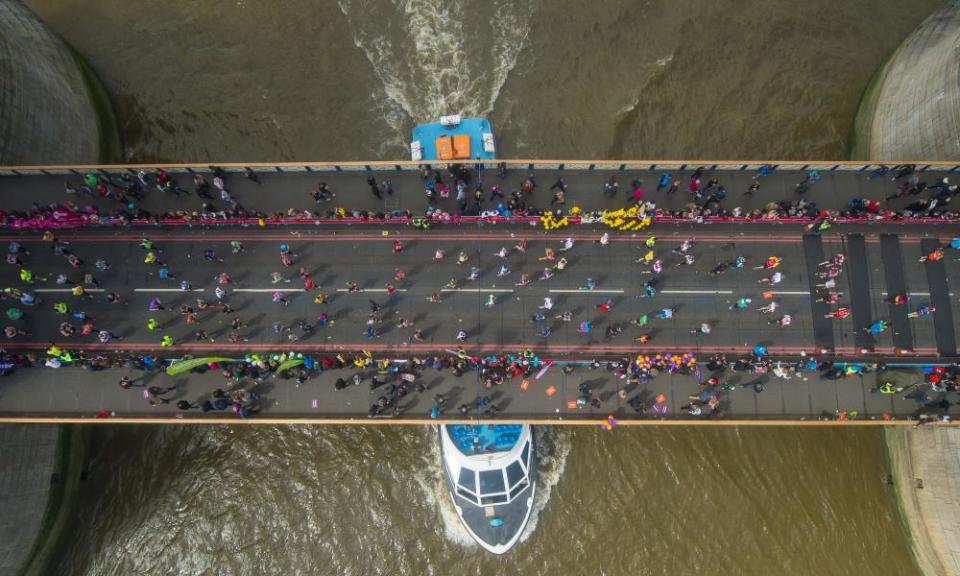Running the London marathon? Neither am I

Marathons, marathons, everywhere: last weekend Brighton was taken over by runners, and tens of thousands more will fill the streets of London on Sunday. In the next few weeks there will be races taking place across the UK, from Milton Keynes to Liverpool, Newport to Stirling. The popularity of the 26.2-mile challenge shows no signs of waning – the Brighton event only started in 2010, and now 12,000 people take part. There are 40,000 places in the London race, and a whopping 386,050 people applied this year – the highest number ever. The majority of them had never run a marathon before.
I have several friends who ran the Brighton marathon this year, and I have nothing but admiration for their endurance and determination. But watching them prepare and recover has also brought home to me what an extreme sport marathon running really is. Legend has it that Pheidippides, the original marathon man, collapsed and died after his exertions – and although these days people usually survive the ordeal, they ain’t looking too pretty afterwards.
This week’s record-breaking temperatures have led to warnings from the London race organisers that runners should “adjust their goal” and reconsider any plans to run in fancy dress. One Brighton friend, who was waiting for her husband at the finish line last Sunday, reports that the runners had all turned a strange shade of blue. After giving her husband a congratulatory hug she asked how he’d got on. “Well, it’s over,” he replied. “And I’ve just vomited.”

Why do so many people want to do this to themselves? The health benefits of long-distance running are debatable: there is, unsurprisingly, a high risk of injury, and health experts regularly point out that if you want to be fit and toned you’d be better off doing a range of strength and cardio exercise than spending five hours a week pounding the pavement. The paleo diet and health guru Chris Kresser goes further, arguing that our bodies have not evolved to cope with large amounts of moderate-intensity exercise (running falls into this category), and that it can have a host of detrimental effects, including depressing the immune system and disrupting cortisol levels, which can apparently promote weight gain. His recipe for a healthy exercise regime is to move frequently at a slow pace, lift heavy things, and sprint occasionally.
Obviously, completing a marathon confers a level of glory that “lifting heavy things occasionally” can never hope to match – and no doubt there are also arguments in favour of running. But we certainly live in a society of body extremes. On the one hand, we have an obesity epidemic and a raging addiction to processed junk food; on the other, we are obsessed with “clean eating” and feats of endurance.
Both are manifestations of the same fear and confusion about bodies. Who and what are bodies for, in our post-industrial era? The economy values them primarily for their ability to consume. Those of us who work in desk jobs treat them as vehicles for our brains, ignoring their needs and wasting their potential while we tap away at keyboards and snack on biscuits. The temptation is to compensate for this neglect by pushing them too far – punishing them, even – in our leisure time.
Personally, I’m aiming for that large and agreeable middle ground between bingeing on Big Macs and Netflix, and grinding out 26 miles. I’m thinking a bracing country walk somewhere beautiful, followed by tea and a scone; Saturdays spent digging at the allotment, and wolfing down a stew when I get home. I’m thinking a decent walk in the morning before I sit down at my desk, and a few sea swims once I work up the courage. And the best thing is that my totally unscientific hunch – that the healthiest activities involve getting some fresh air, working up an appetite and also enjoying yourself – has now won its own expert cheerleaders. It even has an impressive-sounding technical name: low-intensity steady state (Liss) exercise.
So if you are running the marathon this weekend – all power to you, and good luck. But if you’re not, you too can feel the golden glow of righteousness. Walk the dog, take some deep breaths, soak up some sunshine. The health benefits of having a nice day might be greater than you think.
• Alice O’Keeffe is a freelance literary critic and journalist

 Yahoo News
Yahoo News 
